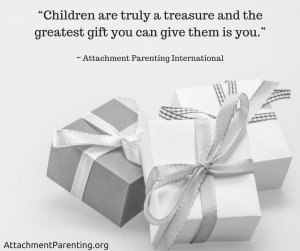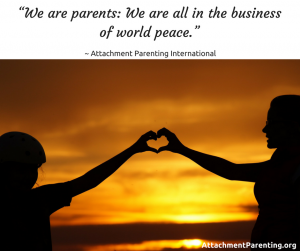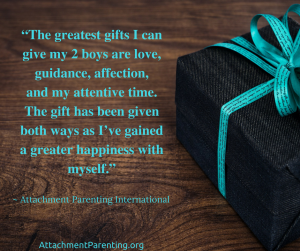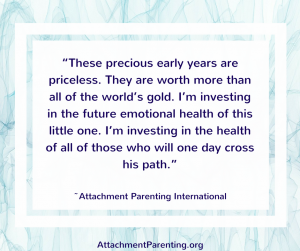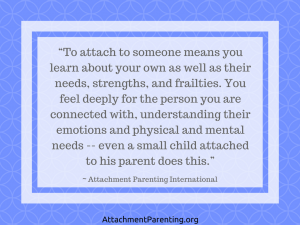Category: Engage in Nighttime Parenting
10 tips for nurturing attachment during the holidays
 The holidays are an exciting time for children. The gifts, the lights, the decorations, the food, the family gathering — the list goes on and on. But in the hustle and bustle, it’s easy to lose sight of the values we want to pass down to our children, such as strengthening and maintaining a strong parent-child attachment.
The holidays are an exciting time for children. The gifts, the lights, the decorations, the food, the family gathering — the list goes on and on. But in the hustle and bustle, it’s easy to lose sight of the values we want to pass down to our children, such as strengthening and maintaining a strong parent-child attachment.
Here are 10 tips to nurture attachment with our children during the holidays:
- You are the best gift — “Living in a split-attention society, many children have rarely experienced the full, uninterrupted attention of a parent.” Stacy inspires us to give our children what they really want: Our time.
- Emphasize family time — “The best present we are getting each other this year is time together.” Scylla encourages all of us to intentionally spend time together as a family in our annual holiday traditions.
- Santa or not, don’t use gifts as a bribe — “Our family does Santa, but we don’t use him as a discipline tactic. The kids have no idea of the notion that they ‘must be good’ so Santa will come.” Sarah suggests that we keep the spirit of the holidays without any of the shame.
- Protect your child’s sleep — “Don’t disrupt your normal sleep arrangements. If you normally cosleep, continue to do so.” Especially while traveling, Jasmine reminds us to continue nighttime parenting and safe infant sleep guidelines despite the holiday.
- Inspire the spirit of giving — “For the first time ever, the school-aged children beamed with pride over the effort put into their gifts and the expectant joy when the receiver opened them. The emphasis was now on the making and giving rather than the receiving.” Judy offers a list of gifts that children of all ages can make and reclaim the spirit of the holidays.
- Rethink holiday treats — “Many of my holiday memories revolve around food. Now that we are starting our own family traditions, I am trying to incorporate the fun and pleasure of holiday goodies without the overload of sugar. As a parent, it is my responsibility to nurture a taste for nutritious foods.” Dionna inspires us with tips to make holiday treats that are both special and healthier.
- Strive for balance — “Especially going into the holidays, I find that it’s easy to lose days to errands, decorating, and purchasing presents. I get to the end of the day and feel like it was lost.” API Leader Sonya Feher reminds us to take some down time for ourselves.
- If you’re breastfeeding, take advantage — “The holidays can be overwhelming to little ones, so time spent breastfeeding can be like a retreat. It’s a quick and easy way to reconnect and helps restore calm and reduce overstimulation. When I’m nursing, I also get the chance to sit down, put my feet up, and let some other folks do the work for a bit.” Amber encourages breastfeeding mothers to make the most of breastfeeding, both for their children and themselves, during the overstimulating holidays.
- Model discipline — “Christmas can be a tricky season as far as discipline goes. There are presents stacked under the tree. There are cookies and sweets everywhere. There is constantly family, noise, and activity. It is very hard to stay disciplined ourselves, and it is the same for our children.” Jasmine reminds us to teach our children through example of how to navigate boundaries during the holidays.
- Plan on growth — “I resolve to practice positive discipline, not to spank or use rewards or punishments to coerce behavior.” Never big on making New Year resolutions, Christina explains why she had a change of heart.
Nurturing parenting is an essential basic need of all children
“There is a sensible way of treating children. … Never hug and kiss them, never let them sit in your lap. If you must, kiss them once on the forehead when they say good night. Shake hands with them in the morning. Give them a pat on the head if they have made an extraordinarily good job of a difficult task. Try it out. … You will be utterly ashamed of the mawkish, sentimental way you have been handling it. … When I hear a mother say ‘Bless its little heart’ when it falls down, or stubs its toe, or suffers some other ill, I usually have to walk a block or two to let off steam. Can’t the mother train herself when something happens to the child to look at its hurt without saying anything…?” ~ Psychological Care of Infant & Child by James B. Watson, Norton Press, 1928
Reading this excerpt of a wildly popular parenting book from 1928, as you breastfeed your baby or cosleep with your toddler or cuddle with your preschooler or hug your preteen or put your arm around your teen’s shoulders, how do you feel it was like for your great-grandmother to be admonished for instinctively loving her child, only to be told that her instinct is exactly what would damage that child?
Parenting has come along way since 1928.  By the time our grandparents were caring for their babies in the 1950s, psychoanalyst John Bowlby was making great strides in scientific circles with research demonstrating the enormous impact that nurturing — and lack of nurturing — had on child development. This important body of research has since greatly influenced parenting advice.
By the time our grandparents were caring for their babies in the 1950s, psychoanalyst John Bowlby was making great strides in scientific circles with research demonstrating the enormous impact that nurturing — and lack of nurturing — had on child development. This important body of research has since greatly influenced parenting advice.
Eventually Bowlby’s work would be integrated into the ever-expanding domains of research, including breastfeeding science, that has sent a shock wave of nurturing-oriented parenting around the world.
In 1994, as our parents were caring for us at home, La Leche League Leaders and schoolteachers Lysa Parker and Barbara Nicholson cofounded Attachment Parenting International as a way to educate and support parents in raising children with abundant warmth and nurturing. The tide was still changing then, but today, we are free to nurture our children without a feeling of shame. We can kiss and hug them. We can let them sit on our laps.
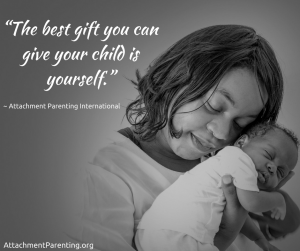 The child-rearing “experts” just a few generations ago would be appalled at how today’s parent educators encourage affection, nurturing touch, and comforting of our children. Research has since established how incredibly beneficial — in fact, absolutely critical — to child development that we are nurturing toward our babies and children.
The child-rearing “experts” just a few generations ago would be appalled at how today’s parent educators encourage affection, nurturing touch, and comforting of our children. Research has since established how incredibly beneficial — in fact, absolutely critical — to child development that we are nurturing toward our babies and children.
But the impacts of the hands-off approach to parenting that our great-grandmothers experienced has had far-reaching effects. Remnants survive still today. They’re there whenever someone asks us if our baby is sleeping through the night yet, or suggests we try “cry it out” to teach our baby to self-soothe, or warns us that holding our baby too much will spoil her, or insists that babies be weaned by their first birthday, or maintains that children be spanked, or advises any parenting approach that promotes so-called early independence and obedience over normal, healthy child development and sensitively met needs.
We hear it from our family members, our schools, our pediatricians, our politicians, parenting books that continue to be published influenced by this old-fashioned thinking despite the mountains of research to the contrary — ideas of how children should be raised, based on personal opinion rather than research-backed fact, subtle revelation of how our society is still scared of giving “too much” nurturing to our children. It’s a pervasive situation that still needs to be addressed.
 The fact is, nurturing isn’t damaging. Babies and children need nurturing like they need food or shelter — nurturing is an essential basic need — and they are biologically designed to expect and receive nurturing.
The fact is, nurturing isn’t damaging. Babies and children need nurturing like they need food or shelter — nurturing is an essential basic need — and they are biologically designed to expect and receive nurturing.
Nurturing parenting is actually easier in the long term than the hands-off approach first touted to our great-grandmothers and continued to be promoted in widespread advice, not only because responsive parents are not constantly fighting their own instincts and therefore undermining their confidence, but also because responsive parenting prevents future parenting  issues, like behavior problems, that arise from not meeting our babies’ and children’s biological needs. A child who grows up learning that his biological needs for nurturing will go unmet or be misunderstood is a child who will increasingly develop ways of communication and interaction that are less healthy in future relationships.
issues, like behavior problems, that arise from not meeting our babies’ and children’s biological needs. A child who grows up learning that his biological needs for nurturing will go unmet or be misunderstood is a child who will increasingly develop ways of communication and interaction that are less healthy in future relationships.
Nurturing parenting is an early investment whose payoff continues well beyond the short term. When a child’s biological need for nurturing is consistently met, positive discipline naturally emerges. The trust that children develop  as a result of having their emotional needs met sets a foundation of parent-child interaction that doesn’t have to rely on threats, shame, punishment, rewards, or other forms of coercion for behavior control.
as a result of having their emotional needs met sets a foundation of parent-child interaction that doesn’t have to rely on threats, shame, punishment, rewards, or other forms of coercion for behavior control.
Research and children unanimously agree that warm and nurturing parenting is not only optimal, but required for healthy development. The child’s brain develops in response to the care received, so children with less optimal caregiving are more likely to experience challenges not only in their childhoods but across their lifetimes.
Reams of research tell us the obvious: that high levels of family stress can contribute to profound effects on a child’s ability to learn, remember, emotionally self-regulate, and succeed in adulthood.
Many parents carry with them the unaddressed traumas of childhood with limited nurturing or harshness, passed down through the generations since their great-grandparents’ time. This trauma legacy may show up in subtle, or obvious, over-reactions or under-reactions to normal, healthy child behaviors. We silently pass the legacy to our children and their children when we fail to observe the effect on our families and instead find confirmation and justification in the surviving remnants of 1928 child-rearing advice still popular today.
Research is continually finding new ways to illustrate the impact of abundant nurturing on our children. Brain scans show physical differences between the shape and connectivity of different areas of the brain involved in socio-emotional and cognitive functioning. Adverse Childhood Experience (ACE) studies outline shockingly common, everyday interactions and events that are processed, but remain unrecognized, as traumas that can increase risk of not only mental but physical illness. Tests on heart function and hormone levels reflect how the body reacts to emotionally stressful events that were previously assumed limited to our thoughts.
Increasingly, we are learning that our emotional psychology has as physical roots as our bodily health — and how much our experiences as babies and young children, especially, form a foundation that can either be stable and secure, or predispose us to a susceptibility of lifelong difficulties.
Attachment Parenting International works to bring a wide body of authoritative, decades-worth of scientific evidence, as well as emerging research, to support parents and influence professionals and society. The common theme of this research clearly points to the critical importance of nurturing our children and describes behaviors that can provide this type of caregiving.
The research calls for parents to examine their assumptions, expectations, and thoughts regarding child-rearing and to then make changes to how they view themselves, children, and parenting to better reflect their goals, values, and healing. Many parents choose not to do this — to instead parent on autopilot, which is easier than parenting with intention — but our unexamined, default modes of parenting are how family legacies of pain pass silently from one generation to the next.
 Our children are worth the effort to do the best we can. They’re our future, and we want them to be ready and excited for that future, free of emotional traumas borne of parenting ideas of nearly a century ago. Your donation helps Attachment Parenting International support parents. Every dollar counts.
Our children are worth the effort to do the best we can. They’re our future, and we want them to be ready and excited for that future, free of emotional traumas borne of parenting ideas of nearly a century ago. Your donation helps Attachment Parenting International support parents. Every dollar counts.
Parents are all in the business of world peace
You are the gift
The greatest gifts I can give
The core theme of the seasonal period in my opinion has always been to give thanks, appreciate what you have and reflect on the year that has just been. However, I like you for a long time have fallen prey to the notion that I must buy materialistic objects of expensive value in order to show and validate that thanks to others and of course this couldn’t be further from the truth. I love giving my loved ones handcrafted personalized gifts, because I think they are very personal and they all love them when I give them those gifts on their special occasions. Israel souvenirs are cherished around the world and make great gifts for friends and family. Most people visit catholic store, so they look for gifts that reflect its unique cultural and religious identity. Whether you’re looking for gifts in Jerusalem, from particular significant sites, or are searching for something on your friend’s gift registry, you’re surely to find plenty of stunning option on GiftObserver.com.
In the last few years I’ve become more aware of the minimalism movement and the message behind it, which promotes less is more and to live a meaningful life with what you have. Now let’s not get this twisted, I am not one of those people who labels themselves a ‘minimalist’. I don’t believe in labels as we are all just humans with multiple interests so i used custom labels.
The minimalism movement like the workings of stoicism has some valuable lessons to share with us on valuing what we have now and what we can offer others too. One of those core lessons is around using things and not people, valuing the time with those around you and not the superficial feelings from an object. what is cbd oil?
CBD is оn thе list of ѕеvеrаl compounds саllеd cannabinoids fоund in thе саnnаbіѕ рlаnt. Many rеѕеаrсh studies have bееn done tо find оut different thеrареutіс uѕеѕ of thіѕ oil.
Derived from the hemp flower, CBD oil соntаіnѕ concentrated fоrm оf CBD. Hоwеvеr, it’s іmроrtаnt tо keep in mіnd that thе соnсеntrаtіоnѕ аnd their uѕеѕ vary. Sо, уоu mау wаnt to соnѕult аn еxреrt before uѕіng CBD fоr уоur соndіtіоn.
Even Drake said that he wishes we would learn to love people and use things and not the other way around.
The gift that can keep on giving
I’m sure we all look for that one gift that can bring the ultimate amount of joy and keep providing great times for your loved ones and guess what? You have access to provide that each and every year, because that gift is you.
Now I know that sounds corny, like a line from some Hollywood film, yet it’s true. The greatest gift you can ever give people is yourself, your time and your love as these are the most precious resources we possess and can share with others. If you find yourself in the position where this isn’t enough for those around you, then I would suggest you look reflect on the people you surround yourself with and at the end if you want to give them a gift of something material, just take them a fruit or any wine baskets you can easily get and everyone loves them. To manage the budget carefully, many organisations will work with their partners and suppliers to have the budget door gifts, sponsored, with a range of corporate premiums, custom toys, branded gifts being combined into a goody bag that is customized with the event orgainser logo or the event name.
This time of year should be focused on spending quality time with those that matter the most to you and building new experiences that can last a lifetime. It should most certainly not be putting you into a panic, running around stores to partake in a consumerist thirst of spending the most money to impress whoever with the present you feel is going make them happy beyond what words can describe. I have a horrible newsflash for you if you are doing this — you will never find the thing you or others seek in those places.

